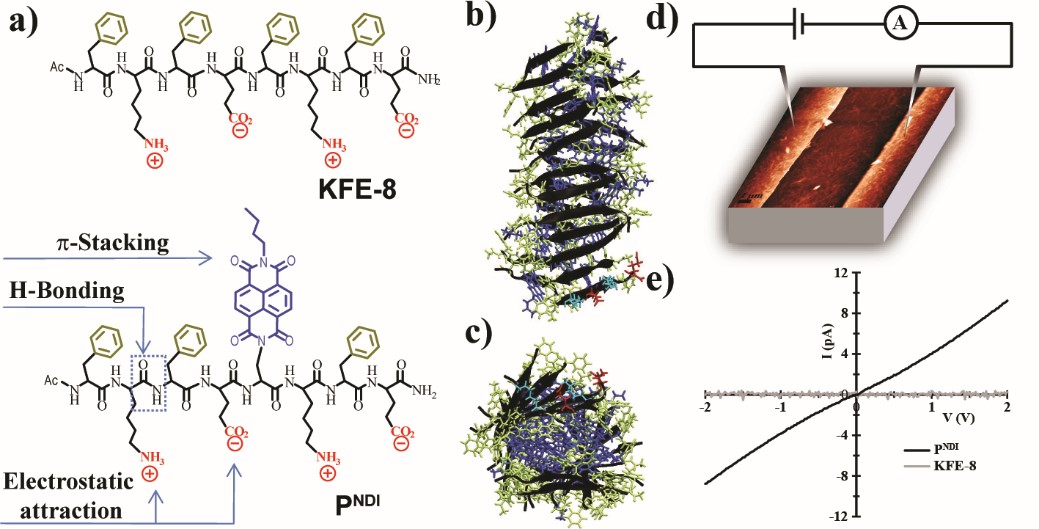
b-sheet peptide fibrils driving charge transfer functionality. ChemComm 2014; Angew Chem. 2016
Electron transfer peptide fibrils. During the past few years, attempts have been made to precisely guide amphiphilic peptide self-assembly into well-defined architectures suitable for various applications in biotechnology and nanotechnology, such as, scaffolding cell tissues, drug delivery, catalysis, and bio-electronics. As part of our long-term program aiming at utilizing peptide-aromatic nanostructures as components of next generation electronic devices, we address the challenge of straightforward elucidation the following relations: peptide assembly conditions à assembly micro-structure and morphology à assembly-dependent device functionality (conductance). We have demonstrated (together with Prof. Nurit Ashkenasy; Dept. of Materials Engineering, BGU) that the assembly process is driven by a collective set of hydrogen bonding, electrostatic and p-stacking interactions and, as a result, can be directed towards formation of a distinct polymorph by using the medium to enhance specific interactions rather than the others. This methodology facilitates the detailed characterization of different polymorphs, and furthermore allows highlighting specific conditions leading to the polymorph with the highest conductivity.
References:
- Ivnitski, D., Amit, M., Silberbush, O., Atsmon-Raz, Y., Nanda, J., Cohen-Luria, R., Miller, Y., Ashkenasy, G. & Ashkenasy, N. The Strong Influence of Structure Polymorphism on the Conductivity of Peptide Fibrils. Angew. Chem., Int. Ed. 2016, 55, 9988-9992.
- Lerner Yardeni, J., Amit, M., Ashkenasy, G. & Ashkenasy, N. Sequence dependent proton conduction in self-assembled peptide nanostructures. Nanoscale, 2016, 8, 2358-2366.
- Ivnitski, D., Amit, M., Rubinov, B., Cohen-Luria, R., Ashkenasy, N. & Ashkenasy, G. Introducing charge transfer functionality into prebiotically relevant β-sheet peptide fibrils. Chem. Commun. 2014, 50, 6733-6736.
- Shlizerman, C., Atanassov, A., Berkovich, I., Ashkenasy, G. & Ashkenasy, N. De Novo Designed Coiled-Coil Proteins with Variable Conformations as Components of Molecular Electronic Devices. J. Am. Chem. Soc. 2010, 132, 5070-5076.
